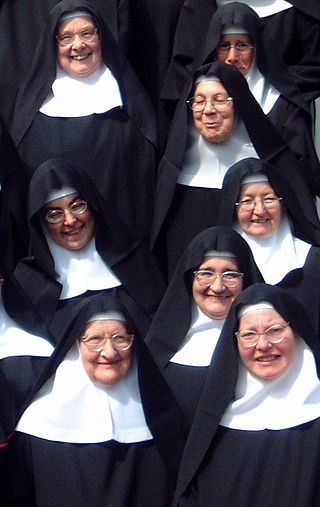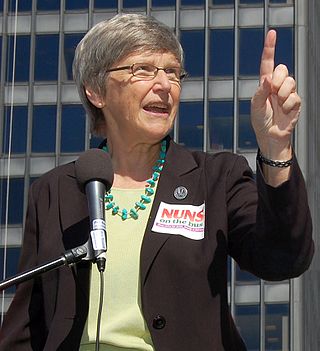
A nun is a woman who vows to dedicate her life to God, typically living under vows of poverty, chastity, and obedience in the enclosure of a monastery or convent. The term is often used interchangeably with religious sisters who do take simple vows but live an active vocation of prayer and charitable work.

The Dicastery for the Doctrine of the Faith (DDF) is the oldest among the departments of the Roman Curia. Its seat is the Palace of the Holy Office in Rome. It was founded to defend the Catholic Church from heresy and is the body responsible for promulgating and defending Catholic doctrine.

Interfaith dialogue refers to cooperative, constructive, and positive interaction between people of different religious traditions and/or spiritual or humanistic beliefs, at both the individual and institutional levels. It is distinct from syncretism or alternative religion, in that dialogue often involves promoting understanding between different religions or beliefs to increase acceptance of others, rather than to synthesize new beliefs.
Joan Daugherty Chittister,, is an American Benedictine nun, theologian, author, and speaker. She has served as Benedictine prioress and Benedictine federation president, president of the Leadership Conference of Women Religious, and co-chair of the Global Peace Initiative of Women.
Sr Jeannine Gramick, SL is an American Catholic religious sister and advocate for lesbian, gay, bisexual, and transgender rights. She is also a co-founder of New Ways Ministry.
NETWORK Lobby for Catholic Social Justice is a national Catholic social justice lobby founded in 1971 and headquartered in Washington, D.C. The organization focuses its lobbying efforts in the areas of economic justice, immigration reform, healthcare, peace making and ecology.
Kathleen P. Deignan, CND,, is an Irish-American theologian, author and songwriter of contemporary liturgical music. A Sister of the Congregation of Notre Dame, she is composer-in-residence for Schola Ministries and is the founding director of the Deignan Institute for Earth and Spirit Institute at Iona College, New York. She previously directed the Iona Institute for Peace and Justice Studies in Ireland. Deignan is a GreenFaith Fellow who completed an intensive training in religious environmental leadership. Her work in this area focuses on the legacy of Father Thomas Berry. She is Emerita President of the International Thomas Merton Society and a Board Member of the American Teilhard Association. She is an author, public speaker, and environmental advocate.

The General Commission on Christian Unity and Interreligious Concerns (GCCUIC) addresses the interreligious and ecumenical concerns of The United Methodist Church. The GCCUIC's office is located at The Interchurch Center in New York City. The Commission's President is Bishop Mary Ann Swenson and the General Secretary is Stephen J. Sidorak Jr. The Ecumenical Officer of the Council of Bishops is Bishop Sharon Zimmerman Rader and serves as the corporate ecumenical officer of The United Methodist Church, working in collaboration with GCCUIC.
Maureen Fiedler, SL is an American progressive activist, radio host, and a member of the Sisters of Loretto. She has a long history working with interfaith coalitions on a variety of issues including: social justice, peace, anti-racism work, gender equality, human rights and female ordination in the Catholic Church. She holds a doctorate in Government from Georgetown University. She is the executive producer and host of the radio show Interfaith Voices, which she originated.

Pullen Memorial Baptist Church is a Baptist church known for its progressive theology located in Raleigh, North Carolina, US, right beside North Carolina State University. Pullen, called "a fiercely independent Baptist church" whose traditions have "earned it a reputation far and wide as the South's premier liberal church," has a long history of civil rights activism, and is currently a leader on key issues of the day, from LGBTQ rights to activism in Moral Monday protests to alliances with like-minded people in distant places from Cuba to Nicaragua to Georgia in the Caucasus Mountains and Black Sea.

Margaret Ellen Traxler, SSND, was a prominent American Religious Sister with the School Sisters of Notre Dame and a prominent women's rights activist. She was also a leader in developing institutions to help poor women in the city of Chicago.

Mother Anna Maria Dengel, Medical Mission Sisters (S.C.M.M.), was an Austrian physician, Religious Sister and missionary. She was the founder of the Medical Mission Sisters, which was among the first congregations of Religious Sisters authorized by the Roman Catholic Church to provide full medical care to the poor and needy in the overseas missions.
We Are Church, an international movement founded in Rome in 1996, is committed to the renewal of the Roman Catholic Church on the basis of the Second Vatican Council (1962-1965) and the theological spirit developed from it.

Women play significant roles in the life of the Catholic Church, although excluded from the Catholic hierarchy of bishops, priests, and deacons. In the history of the Catholic Church, the church often influenced social attitudes toward women. Influential Catholic women have included theologians, abbesses, monarchs, missionaries, mystics, martyrs, scientists, nurses, hospital administrators, educationalists, religious sisters, Doctors of the Church, and canonised saints. Women constitute the majority of members of consecrated life in the Catholic Church: in 2010, there were around 721,935 professed women religious. Motherhood and family are given an exalted status in Catholicism, with The Blessed Virgin Mary holding a special place of veneration.
Sisters for Christian Community is a contemporary, non-canonical, ecumenical community of religious sisters founded in 1970 in direct response to the Catholic Church's Second Vatican Council.

The Dominican Order was first established in the United States by Edward Fenwick in the early 19th century. The first Dominican institution in the United States was the Province of Saint Joseph, which was established in 1805. Additionally, there have been numerous institutes of Dominican Sisters and Nuns.
The Dominican Sisters of Peace is a congregation of Dominican Sisters of apostolic life, founded on Easter Sunday, April 12, 2009, from the union of seven former Dominican foundations. With general offices in Columbus, Ohio, the congregation holds legal incorporation in the state of Kentucky, home of the founding community of earliest historical origin. In 2012, following a vote by their General Chapter, the Dominican sisters of Catherine de' Ricci became the eighth foundation to join the Dominican Sisters of Peace.

Simone Campbell, SSS, is an American Catholic religious sister, lawyer, lobbyist and executive director of NETWORK. She belongs to the Sisters of Social Service. She is known as an outspoken advocate for social justice.
Patricia (Pat) Reif, also known as Sister Richard,, was an American professor of philosophy and theology, known locally and nationally for her involvement in ecumenical issues, for her innovative leadership in the field of feminist spirituality and for her leadership in the Women's Ordination Conference. She was a founding member and leader of the ecumenical Immaculate Heart of Mary Community established in 1970 in Los Angeles as a result of irreconcilable differences between Cardinal James F. McIntyre over the implementation of Vatican II reforms. Along with the 455 vowed members of the canonical order of the Immaculate Heart of Mary, Reif was a leader in the development of the new community's innovative philosophical foundations. Most notably, in 1984, as chair of the religious studies department at Immaculate Heart College Center, she founded the nation's first graduate program in Feminist Spirituality.
Patricia (Trish) Madigan OP is an Australian religious sister, a member of The Dominican Sisters of Eastern Australia and the Solomon Islands and Executive Director of the Dominican Centre for Interfaith Ministry Education and Research (CIMER).










